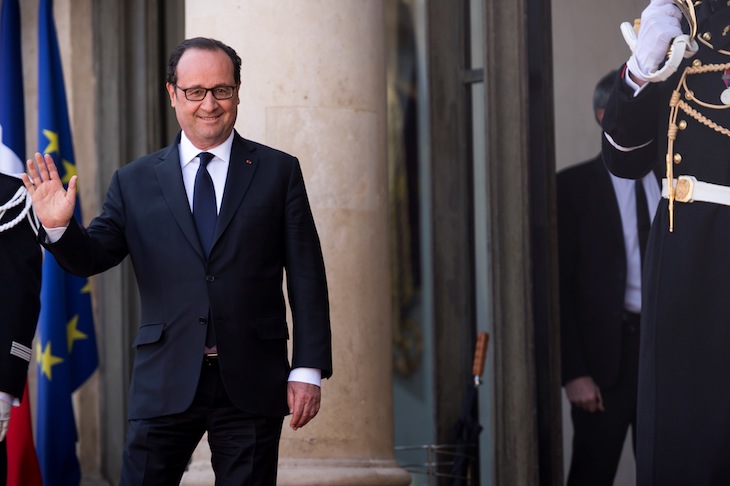In the biggest comeback since Lazarus, French president François Hollande has installed Emmanuel Macron as his certain successor, with the collusion of the media, the magistrates and less than 25 per cent of the voters.
If Hollande has been a terrible president, the result of the first round of voting confirms that he is a master political technician, with a specialty in dirty tricks. It seems impossible that he will now retire quietly from public life. Whether he will have an official role, or merely be a Svengali-like figure in the shadows of the presidency remains to be seen.
One by one, obstacles to Macron’s succession were ruthlessly eliminated and Hollande’s fingerprints are everywhere.
Days after winning the Republican party primary, François Fillon, once Macron’s most dangerous potential opponent, was put under investigation for having put his wife and children on the payroll of the state, with little evidence that they did much if any work.
The evidence against Fillon appears to have come directly from a secretive cell within the Finance Ministry, a Cabinet Noir, with access to the tax returns of both Fillon and his Welsh wife, Penelope. These documents found their way to the investigating magistrates, who pounced. Only the naive can imagine that the magistrates are unmotivated by their political sympathies, especially after it was revealed that their union had compiled an enemies list of right wing politicians targeted for prosecution, and had even posted their pictures on the wall of their Paris headquarters.
Hollande’s second weapon was the media. BFM TV, the French equivalent of CNN, took a two-pronged approach, relentlessly attacking Fillon and Le Pen, while boosting Macron and ignoring questions about his own financial affairs. Although he made millions as a Rothschild banker, his declaration of patrimony suggested that he was practically penniless.
The print media followed. Journalists, who enjoy a special tax regime in France, which Le Pen had threatened to terminate, needed little encouragement.
Plenty of others piled in behind Macron. The EU, nakedly intervening, established a cell in Brussels to counter ‘fake news’ allegedly disseminated by Le Pen. Even former president Obama was enlisted, calling Macron just before the voting in an unmistakable gesture of support.
It is being said by some here that the victory of Macron represents the extermination of the socialist party, but this is hardly credible. Macron was himself a member of the party before resigning to reposition himself as an independent and he has admitted that he is a man of the left, although he has subsequently denied it.
While he intends to present a slate of candidates in the forthcoming elections for the national assembly, socialist stalwarts have rushed to endorse him, and will doubtless be rewarded in due course with ministerial appointments. His claim to have established a third-way political party is not credible. It is a party in which all decisions are apparently made by Macron and his inner circle and whose members have no apparent voice.
The French media will now rush to present Macron as a genuinely fresh face in politics and for a while at least they may succeed. But evidence that the voters love Macron is slim. His score in round one indicates that less than 25 per cent of voters regard him as their first choice. The concerns of many French voters over Europe, terrorism, the single currency and national identity will not be assuaged.
For France, the outlook remains grim. The worst of all possible scenarios has been avoided: a second round contest between the hard-line socialist Jean-Luc Mélenchon and Le Pen. That would have provoked an immediate political and financial crisis that could have spelled the collapse of the Fifth Republic. Instead, the French seem poised to elect a President whose continuity with the failed regime of Hollande will produce five more years of social, economic and political stagnation. Next time, the French elite may find it harder to fend off a challenge from politicians from outside of the mainstream.
Many in Britain will be pleased that the challenge from Le Pen has now been neutered. But this satisfaction must be tempered because fundamentally, Macron is not our friend. Although he speaks passable English and wears a nice suit, he represents the continuation of visceral anti-British politics and the desire to punish Britain for Brexit. If the second round of this election now looks like a formality, Macron’s presidency looks unlikely to resolve any of the challenges facing a nation that seems unable to agree on anything.
Jonathan Miller is the author of France a Nation on the Verge of a Nervous Breakdown (Gibson Square). He tweets at @lefoudubaron.
 Jonathan Miller
Jonathan Miller
The real winner of the French presidential election? François Hollande







Comments